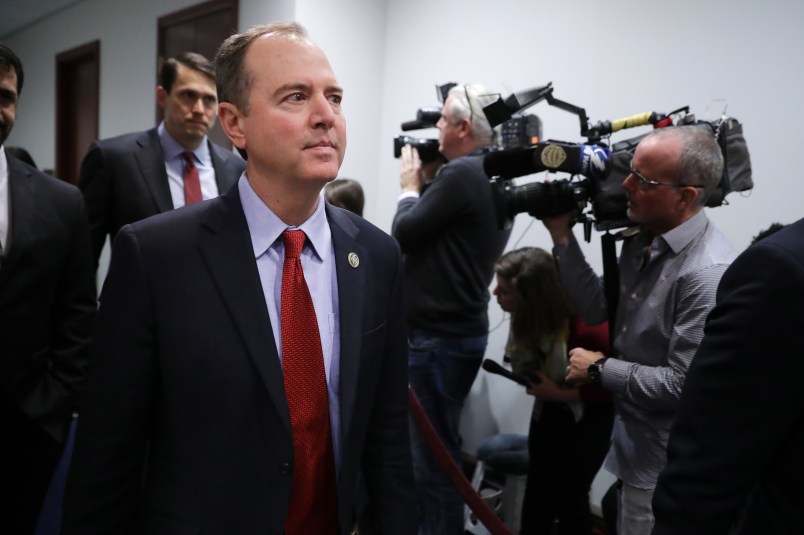House Intelligence Committee Chair Rep. Adam Schiff (D-CA) released a redacted copy of the long-awaited whistleblower complaint on Thursday, laying out sweeping allegations that President Trump pressured Ukraine to interfere on his behalf in the 2020 elections as White House officials strove to cover up the effort.
The complaint focuses on efforts by Trump and his personal attorney Rudy Giuliani to pressure the Ukrainian government into manufacturing helpful political information, and lays out internal reactions from White House officials to the campaign. Those officials were in some cases alarmed by the effort and, in other cases, attempted to hide President Trump’s tracks as he and his personal lawyer sought information that could help him in the 2020 election.
“In the course of my official duties, I have received information from multiple U.S. Government officials that the President of the United States is using the power of his office to solicit interference from a foreign country in the 2020 U.S. election,” the redacted complaint reads.
The unnamed whistleblower accuses both Giuliani and Attorney General Bill Barr of involvement in the pressure campaign. The Justice Department released a statement distancing itself from the effort on Wednesday, after the White House released a transcript of a July 25 phone call between Trump and Ukraine’s President Volodymyr Zelensky.
The whistleblower described the activity as occurring over the four months preceding the August complaint, and said that, while he or she was not a direct witness to the conduct, much of the behavior was described to the whistleblower by multiple witnesses.
The first section of the complaint describes Trump’s July 25 call with Zelensky — a record of which the White House released on Wednesday — and said the White House officials who told him or her about the call were “deeply disturbed.”
According to the whistleblower’s White House sources, there had been a “discussion ongoing” among White House lawyers about how to treat the call because “of the likelihood, in the officials’ retelling, that they had witnessed the President abuse his office for personal gain.”
From there, the complaint moves to a discussion of what the whistleblower describes as “efforts to restrict access to records related to the call.”
Those appear to encompass alleged efforts by top White House officials to “lock down” records of the call, including alleged orders from White House lawyers to “remove the electronic transcript from” a computer system where such records are typically stored.
Rather, the complaint alleges, the document was moved “into a separate electronic system” used to “store and handle classified information of an especially sensitive nature.”
The whistleblower cites a White House official as calling the decision “an abuse” of the electronic system, “because the call did not contain anything remotely sensitive from a national security perspective.”
The complaint purports to document a period of time following Trump’s call with Zelensky, in which State Department officials travelled to Kyiv and met with top Ukrainian officials and during which Giuliani himself met with a top Zelensky foreign policy adviser in Madrid.
The report suggests that two U.S. officials who traveled to Kyiv — U.S. Ambassador to the European Union Gordon Sondland and Special Representative for the Ukraine Negotiations Kurt Volker — spoke to Giuliani “in an attempt to ‘contain the damage’ to U.S. national security” and to “help Ukrainian leaders understand and respond to the differing messages they were receiving from official U.S. channels on the one hand, and from Mr. Giuliani on the other.”
Multiple U.S. officials were “deeply concerned” by what the complaint describes as “Giuliani’s circumvention of national security decisionmaking processes,” according to the whistleblower’s sources.
The whistleblower traces the beginnings of the pressure campaign to discussions that Giuliani had with then-Ukrainian general prosecutor Yury Lutsenko, who gave an extensive series of interviews to The Hill’s John Solomon in March 2019 that hit a number of right-wing theories around Ukraine, including the debunked allegations against former Vice President Joe Biden and his son Hunter, supposed Ukrainian interference in the 2016 election aimed at damaging former Trump campaign manager Paul Manafort, and supposed disloyalty by then-U.S. Ambassador to Ukraine Marie Yovanovitch.
The complaint alleges that Giuliani attempted to convince Ukrainian leaders to act on the allegations made by Lutsenko, who was fighting at the time to keep his job as prosecutor general in Zelensky’s new administration. (Lutsenko left office in August.)
Ukrainian officials appear to have understood what was expected of them, the complaint reads, and also perceived that a potential meeting between Trump and Zelensky hung on whether the Ukrainian leader “showed willingness to ‘play ball'” on the Biden investigation.
An appendix attached to the complaint is heavily redacted.
One section of the appendix appears to focus on a May 14 order that Trump gave to Vice President Mike Pence to “cancel his planned travel” to Zelensky’s inauguration. It’s not clear if the cancellation was linked to the pressure campaign.
The appendix also states that the White House’s Office of Management and Budget cancelled security assistance to Ukraine on July 18 – one week before the call with Zelensky.
“As of early August, I heard from U.S. officials that some Ukrainian officials were aware that U.S. aid might be in jeopardy, but I do not know how or when they learned of it,” the complaint reads.
This post has been updated.






